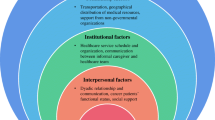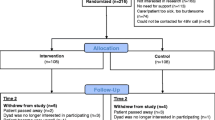Abstract
Purpose
We examined the effects of an enhanced informal caregiver training (Enhanced-CT) protocol in cancer symptom and caregiver stress management to caregivers of hospitalized cancer patients.
Methods
We recruited adult patients in oncology units and their informal caregivers. We utilized a two-armed, randomized controlled trial design with data collected at baseline, post-training, and at 2 and 4 weeks after hospital discharge. Primary outcomes were self-efficacy for managing patients’ cancer symptoms and caregiver stress and preparedness for caregiving. Secondary outcomes were caregiver depression, anxiety, and burden. The education comparison (EDUC) group received information about community resources. We used general linear models to test for differences in the Enhanced-CT relative to the EDUC group.
Results
We consented and randomized 138 dyads: Enhanced-CT = 68 and EDUC = 70. The Enhanced-CT group had a greater increase in caregiver self-efficacy for cancer symptom management and stress management and preparation for caregiving at the post-training assessment compared to the EDUC group but not at 2- and 4-week post-discharge assessments. There were no intervention group differences in depression, anxiety, and burden.
Conclusion
An Enhanced-CT protocol resulted in short-term improvements in self-efficacy for managing patients’ cancer symptoms and caregiver stress and preparedness for caregiving but not in caregivers’ psychological well-being. The lack of sustained effects may be related to the single-dose nature of our intervention and the changing needs of informal caregivers after hospital discharge.

Similar content being viewed by others
References
Adler NE, Page AEK (2008) Cancer care for the whole patient: meeting psychosocial health needs. National Academies Press, Washington, DC
Smith BD, Smith GL, Hurria A et al (2009) Future of cancer incidence in the United States: burdens upon an aging, changing nation. J Clin Oncol 27:2758–65
American Cancer Society (2014) Cancer facts & figures 2014. Atlanta, American Cancer Society http://www.cancer.org/acs/groups/content/@research/documents/webcontent/acspc-042151.pdf
Kim Y, Schulz R (2008) Family caregivers’ strains: comparative analysis of cancer caregiving with dementia, diabetes, and frail elderly caregiving. J Aging Health 20:483–503
Schumacher KL, Koresawa S, West C et al (2002) Putting cancer pain management regimens into practice at home. J Pain Symptom Manage 23:369–82
Sutton LM, Clipp EC, Winer EP (2000) Mangement of the terminally ill patient. In: Hunter CP, Johnson KA, Muss HB (eds) Cancer in the elderly. Dekker, New York, pp 543–572
Given B, Sherwood PR (2006) Family care for the older person with cancer. Semin Oncol Nurs 22:43–50
Scherbring M (2002) Effect of caregiver perception of preparedness on burden in an oncology population. Oncol Nurs Forum 29:E70–E76
Hodges LJ, Humphris GM, Macfarlane G (2005) A meta-analytic investigation of the relationship between the psychological distress of cancer patients and their carers. Soc Sci Med 60:1–12
Cornwell P, Dicks B, Fleming J et al (2012) Care and support needs of patients and carers early post-discharge following treatment for non-malignant brain tumour: establishing a new reality. Support Care Cancer 20:2595–2610
Shaw J, Harrison J, Young J et al (2013) Coping with newly diagnosed upper gastrointestinal cancer: a longitudinal qualitative study of family caregivers’ role perception and supportive care needs. Support Care Cancer 21:749–756
Foust JB, Vuckovic N, Henriquez E (2012) Hospital to home health care transition: patient, caregiver, and clinician perspectives. West J Nurs Res 34:194–212
Nosbusch JM, Weiss ME, Bobay KL (2011) An integrated review of the literature on challenges confronting the acute care staff nurse in discharge planning. J Clin Nurs 20:754–774
Plank A, Mazzoni V, Cavada L (2012) Becoming a caregiver: new family carers’ experience during the transition from hospital to home. J Clin Nurs 21:2072–2082
Hendrix C, Ray C (2006) Informal caregiver training on home care and cancer symptom management prior to hospital discharge: a feasibility study. Oncology nursing forum 33:793–798
Hendrix CC, Abernethy A, Sloane R et al (2009) A pilot study on the influence of an individualized and experiential training on cancer caregiver’s self-efficacy in home care and symptom management. Home Healthc Nurse 27:271–278
Hendrix CC, Landerman R, Abernethy AP (2013) Effects of an individualized caregiver training intervention on self-efficacy of cancer caregivers. West J Nurs Res 35:590–610
Bandura A (1997) Self-efficacy: the exercise of control. Freeman, New York
Bailey DE Jr, Steinhauser K, Hendrix C et al (2011) Pairing self-management with palliative care: intervening in life-limiting illness. J Nurs Healthc Chronic Illn 3:1–3
Varvogli L, Darviri C (2011) Stress management techniques: evidence-based procedures that reduce stress and promote health. Health Science Journal 5:74–89
Porter LS, Keefe FJ, Garst J et al (2008) Self-efficacy for managing pain, symptoms, and function in patients with lung cancer and their informal caregivers: associations with symptoms and distress. Pain 137:306–315
Archbold PG, Stewart BJ, Greenlick MR et al (1990) Mutuality and preparedness as predictors of caregiver role strain. Res Nurs Health 13:375–384
Grant JS, Elliott TR, Weaver M et al (2002) Telephone intervention with family caregivers of stroke survivors after rehabilitation. Stroke 33:2060–2065
Hudson PL, Hayman-White K (2006) Measuring the psychosocial characteristics of family caregivers of palliative care patients: psychometric properties of nine self-report instruments. J Pain Symptom Manage 31:215–228
Curran SL (1995) Short form of the profile of mood states (POMS-SF): psychometric information. Psychological Assessment 7:80–83
Shacham S (1983) A shortened version of the profile of mood states. J Pers Assess 47:305–306
Hall LA, Gurley DN, Sachs B et al (1991) Psychosocial predictors of maternal depressive symptoms, parenting attitudes, and child behavior in single-parent families. Nurs Res 40:214–220
Radloff LS (1977) The CES-D scale a self-report depression scale for research in the general population. Applied psychological measurement 1:385–401
Given CW, Given B, Stommel M et al (1992) The caregiver reaction assessment (CRA) for caregivers to persons with chronic physical and mental impairments. Res Nurs Health 15:271–283
Bass PF, Wilson JF, Griffith CH (2003) A shortened instrument for literacy screening. J Gen Intern Med 18:1036–1038
Fillenbaum GG, Smyer MA (1981) The development, validity, and reliability of the OARS multidimensional functional assessment questionnaire. J Gerontol 36:428–434
Cella DF, Tulsky DS (1993) Quality of life in cancer: definition, purpose, and method of measurement. Cancer Invest 11:327–336
Cella DF, Tulsky DS, Gray G et al (1993) The Functional Assessment of Cancer Therapy scale: development and validation of the general measure. J Clin Oncol 11:570–579
Lent L, Hahn E, Eremenco S et al (1999) Using cross-cultural input to adapt the Functional Assessment of Chronic Illness Therapy (FACIT) scales. Acta Oncol 38:695–702
Borm GF, Fransen J, Lemmens WA (2007) A simple sample size formula for analysis of covariance in randomized clinical trials. J Clin Epidemiol 60:1234–1238
Raghunathan TE, Lepkowski JM, Van Hoewyk J et al (2001) A multivariate technique for multiply imputing missing values using a sequence of regression models. Survey Methodology 27:85–96
Olsen MK, Stechuchak KM, Edinger JD et al (2012) Move over LOCF: principled methods for handling missing data in sleep disorder trials. Sleep Med 13:123–132
van Buuren S (2007) Multiple imputation of discrete and continuous data by fully conditional specification. Stat Methods Med Res 16:219–242
Grant JS, Glandon GL, Elliott TR et al (2004) Caregiving problems and feelings experienced by family caregivers of stroke survivors the first month after discharge. International Journal of Rehabilitation Research 27:105–111
Zarit SH (2006) Assessment of family caregivers: a research perspective. Caregiver assessment: voices and views from the field, volume II. San Francisco, CA, National Center on Caregiving at Family Caregiver Alliance https://caregiver.org/sites/caregiver.org/files/pdfs/v2_consensus.pdf
Centers for Medicare & Medicaid Services (2014) Readmissions Reduction Program. http://www.cms.gov/Medicare/Medicare-Fee-for-Service-Payment/AcuteInpatientPPS/Readmissions-Reduction-Program.html.
U.S. News and World Report, Health (2014) Duke University Hospital. http://health.usnews.com/best-hospitals/area/nc/duke-university-medical-center-6360355/cancer
Acknowledgments
The authors thank Iris Pounds, Margaret Falkovic, Melanie Paige, Sarah Garrigues, Sophia Duong, and Terry Ervin for their assistance. We also extend our gratitude to Duke oncology unit staff and to all study participants for their time and effort.
Funding support
This study was funded by the National Institute of Nursing Research (P01 NR010948; Clinical Trials identifier NCT00938769). Dr. Abby J. Schwartz receives support from the National Institutes of Health grant number T32 AG000029.
Conflict of interest
The authors declare that they have no conflict of interest. The authors have full control of all primary data and agree to allow the journal to review the data if requested.
Disclaimer
The views expressed in this article are those of the authors and do not necessarily represent the views of the Department of Veterans Affairs.
Ethical approval
All procedures performed in studies involving human participants were in accordance with the ethical standards of Duke University Health System Institutional Review Board and with the 1964 Helsinki declaration and its later amendments or comparable ethical standards.
Informed consent
Informed consent was obtained from all individual participants included in the study.
Author information
Authors and Affiliations
Corresponding author
Rights and permissions
About this article
Cite this article
Hendrix, C.C., Bailey, D.E., Steinhauser, K.E. et al. Effects of enhanced caregiver training program on cancer caregiver’s self-efficacy, preparedness, and psychological well-being. Support Care Cancer 24, 327–336 (2016). https://doi.org/10.1007/s00520-015-2797-3
Received:
Accepted:
Published:
Issue Date:
DOI: https://doi.org/10.1007/s00520-015-2797-3




